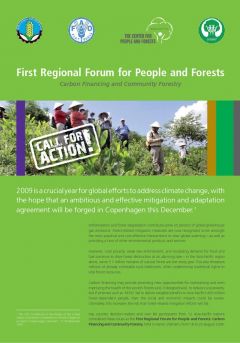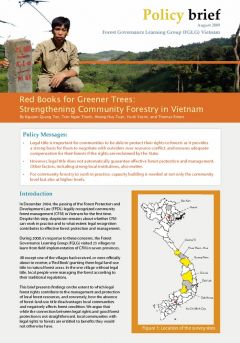Location
RECOFTC
RECOFTC is derived from an abbreviated form of the organization's legal name, Regional Community Forestry Training Center for Asia and the Pacific. Formerly the organization was known as RECOFTC – The Center for People and Forests.
RECOFTC – The Center for People and Forests is an international not-for-profit organization that focuses on capacity building for community forestry in the Asia Pacific region. It advocates for the increased involvement of local communities living in and around forests - some 450 million people in Asia-Pacific - in the equitable and ecologically sustainable management of forest landscapes.
The Regional Community Forestry Training Center for Asia and the Pacific (RECOFTC) opened in Bangkok, Thailand, in March 1987 with support from the United Nations Food and Agriculture Organization, the Government of Switzerland (through the Asian Development Bank), and Thailand's Kasetsart University.
Community forestry is widely acknowledged as a powerful solution for many of the challenges facing local people and the wider society, especially in improving rural livelihoods, enhancing community governance and empowerment, transforming forest-related conflict, protecting and enhancing the environment, and helping to fight climate change. As a capacity-building organisation, RECOFTC improves the ability of people and organisations to conduct community forestry effectively and sustainably.
RECOFTC works toward its mission through four thematic areas:
- expanding community forestry
- people, forests and climate change
- transforming forest conflict
- securing local livelihoods.
Members:
Resources
Displaying 411 - 415 of 485Call for Action: First Regional Forum for People and Forests
Local people hold the key to healthy forests, and if forest carbon-financing schemes are to succeed, they must actively engage and benefit these crucial stakeholders.
Decoding REDD: Negotiating Forest Land-Use Change
In many areas within the Asia-Pacific region, there are compelling short-term incentives to degrade or to convert forestland for other uses. A common example is poorly regulated timber markets, which provide financial rewards for logging that is inadequately managed, unsustainable, and often illegal. Other examples include poorly planned land conversion for mining, agriculture, and large-scale agribusiness plantations as well as spontaneous clearing by farmers.
Red Books for Greener Trees: Strengthening Community Forestry in Vietnam
In December 2004, the passing of the Forest Protection and Development Law (FPDL) legally recognized community forest management (CFM) in Vietnam for the first time. Despite this step, skepticism remains about whether CFM can work in practice and to what extent legal recognition contributes to effective forest protection and management.
During 2008, in response to these concerns, the Forest Governance Learning Group (FGLG) visited 25 villages to learn from field implementation of CFM in seven provinces.
Red Books for Greener Trees: Strengthening Community Forestry in Vietnam
In December 2004, the passing of the Forest Protection and Development Law (FPDL) legally recognized community forest management (CFM) in Vietnam for the first time. Despite this step, skepticism remains about whether CFM can work in practice and to what extent legal recognition contributes to effective forest protection and management.
During 2008, in response to these concerns, the Forest Governance Learning Group (FGLG) visited 25 villages to learn from field implementation of CFM in seven provinces.
Decoding REDD: Addressing and Assessing the Second 'D'
Available scientific literature indicates forest degradation emissions are of a similar magnitude to those from deforestation. The potential for further emissions from degradation is an especially pressing concern in the Asia-Pacific region, where many forest areas are intertwined with highly populated areas and intensive timber harvesting. Including forest degradation in a reduced emissions from deforestation and forest degradation (REDD) mechanism will be crucial to ensure that both the Asia-Pacific and global forest sectors realize their full potential to mitigate climate change.





